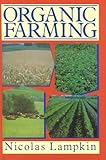Living Organic Online Store
Farming in Nature's Image: An Ecological Approach to Agriculture
" Farming in Nature's Image" provides, for the first time, a detailed look into the pioneering work of The Land Institute, the leading educational and research organization for sustainable agriculture.The authors draw on case studies, hands-on experience, and research results to explain the applications of a new system of agriculture based on one unifying concept: that farms should mimic the ecosystems in which they exist. They present both theoretical and practical information, including: a review of the environmental degradation resulting from current farming practices a critical evaluation of the attempts to solve these problems a detailed description of the ecosystem perspective and the proposed new agricultural system a case study illustrating how this new system could be applied to temperate grain production using perennial seed crops and the prairie as a model an examination of the potential savings in energy and water use, as well as potential contributions to ecological experiments and yield analysis work from The Land Institute.Written in clear, non-technical language, this book will be of great interest to soil and agricultural scientists, academics, policymakers, environmentalists, and other concerned with finding long-range solutions to agricultural problems.
Related Products
Organic Farming, Revised Edition
The current growth of organic farming is being fuelled by market demand. Nicolas Lampkin's book spells out both the principles underlying organic farming and the practical ways in which farmers can respond. He is particularly concerned with the economics of organic farming - a key point for farmers thinking of converting their land. The first part of his book spells out the principles: soil structure, crop nutrition, management of wastes, rotation design, weed management, pest and disease control, livestock husbandry. In the second part he goes into practical details for livestock systems, grassland and fodder crops, arable and horticultural crops, marketing and processing, physical and financial performance, and the conversion process. Some of the evidence on food quality and environmental impact is also reviewed. This is a guide to a way of farming which aims to be in partnership with the natural world rather than dominating it.
Turn Here Sweet Corn: Organic Farming Works
When the hail starts to fall, Atina Diffley doesn’t compare it to golf balls. She’s a farmer. It’s “as big as a B-size potato.” As her bombarded land turns white, she and her husband Martin huddle under a blanket and reminisce: the one-hundred-mile-per-hour winds; the eleven-inch rainfall (“that broccoli turned out gorgeous”); the hail disaster of 1977. The romance of farming washed away a long time ago, but the love? Never. In telling her story of working the land, coaxing good food from the fertile soil, Atina Diffley reminds us of an ultimate truth: we live in relationships—with the earth, plants and animals, families and communities.A memoir of making these essential relationships work in the face of challenges as natural as weather and as unnatural as corporate politics, her book is a firsthand history of getting in at the “ground level” of organic farming. One of the first certified organic produce farms in the Midwest, the Diffleys’ Gardens of Eagan helped to usher in a new kind of green revolution in the heart of America’s farmland, supplying their roadside stand and a growing number of local food co-ops. This is a story of a world transformed—and reclaimed—one square acre at a time.And yet, after surviving punishing storms and the devastating loss of fifth-generation Diffley family land to suburban development, the Diffleys faced the ultimate challenge: the threat of eminent domain for a crude oil pipeline proposed by one of the largest privately owned companies in the world, notorious polluters Koch Industries. As Atina Diffley tells her David-versus-Goliath tale, she gives readers everything from expert instruction in organic farming to an entrepreneur’s manual on how to grow a business to a legal thriller about battling corporate arrogance to a love story about a single mother falling for a good, big-hearted man.
Attracting Native Pollinators: The Xerces Society Guide Protecting North America's Bees and Butterflies
The recent decline of the European honey bee and other pollinators in North America poses a serious challenge to maintaining our food supply and ecological health. According to the National Academy of Sciences, close to 75 percent of all flowering plants rely to some degree on pollinators in order to set seed or fruit. From these plants comes one-third of the planet's food, including fruit and vegetable crops, as well as forage seed crops such as alfalfa, which are critical to dairy and meat production. "Attracting Native Pollinators" is a comprehensive guidebook for gardeners, small farmers, orchardists, beekeepers, naturalists, environmentalists, and public land managers on how to protect and encourage the activity of the native pollinators of North America. Written by staff of the Xerces Society, an international nonprofit organization that is leading the way in pollinator conservation, this book presents a thorough overview of the problem along with positive solutions for how to provide bountiful harvests on farms and gardens, maintain healthy plant communinities in wildlands, provide food for wildlife, and beautify the landscape with flowers. Full-color photographs introduce readers to more than 80 species of native pollinators -- including bees, flies, butterflies, wasps, and moths -- noting each one's range and habits. The heart of the book provides detailed garden plans and techniques showing how to create flowering habitat to attract a variety of these pollinators, help expand the pollinator population, and provide pollinators with inviting nesting sites. Readers will also find useful instructions for creating nesting structures, educational activities for involving children, and an extensive list of resources. "Attracting Native Pollinators" is an essential reference book and action guide for anyone who is involved in growing food or is concerned about the future of our food supply. The Xerces Society, a nonprofit conservation organization, is a leader in the effort to conserve North America's native pollinators. Founded in 1971, the society has its headquarters in Portland, Oregon, and sponsors advocacy, education, and applied research projects across the continent aimed at protecting and managing critical habitat for pollinators.





